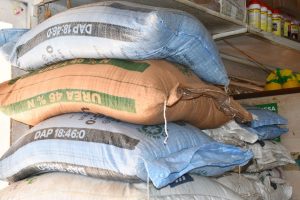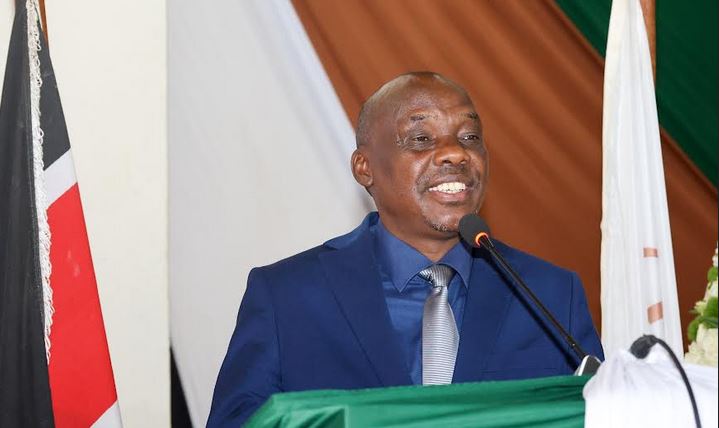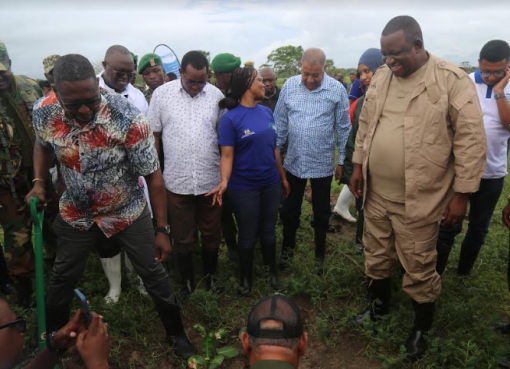The government has put up an aggressive fertiliser subsidy programme with plans to procure and distribute close to 12.5 million bags of fertiliser to at least 6.5 million farmers across the country this planting season.
State Department of Agriculture Principal Secretary Dr. Kipronoh Ronoh says the government has already procured five million bags of fertiliser for the current long rainy season to ensure that farmers have access to farm inputs.
The PS was speaking Wednesday at the sidelines of a conference when he presided over the launch of the second Kenya Agricultural Livestock and Research Organisation (KALRO) Strategic Plan that will run for the next 5 years.

“Last week, we flagged off one million bags of fertiliser from the port of Mombasa, which, as we talk now, have all been distributed to the NCPB depot,” he said.
He, however, expressed fears that farmers were not getting the right fertiliser in terms of quality, as identified by KALRO through research and soil health.
To ensure that no fertiliser will sneak into the market without the government being aware, the PS said they have engaged quality experts, including KEBS and KEPHIS, to start testing the quality of fertilisers as they enter the country.
“The one million bags we received last week went through a thorough test, and I want to assure all the farmers now that the fertilisers we have in Kenya meet the required standard, and farmers can now go to the farm and farm,” Dr. Ronoh said.
The PS said that individuals who took part in supplying fertilizers that had not met the standards have already been arrested and their factory licenses suspended and closed down pending criminal justice.
“We will ensure those individuals are brought to book for farmers to get justice. Some of them had tried to run away, but the government administration took charge and closed the borders. They were arrested and are at the DCI writing statements,” he said.
Other individuals, the PS added, had tried to feign illness by trying to be admitted in hospitals and now the government has engaged the hospitals to flush them out after investigating that they are not sick.
“I want to assure Kenyans and all our farmers that we can now go and farm for maximum production. We have removed those selling fake seeds, the fertiliser crooks, and we are still removing traders who are distributing pesticides that are not meeting the standards,” PS Ronoh said.
On fertilisers, he confirmed that five individuals have already been arrested and the two factories shut down, while 30 have been nabbed for selling fake seeds and 24 for selling the wrong pesticide.
He also urged citizens to assist the government whenever they noticed something that was not normal, especially in the production system.
The PS confirmed that farmers who were identified to have received the fake fertilizer have been compensated by the government with top dressing to help address nutrient deficiencies in their farms.
One week ago, President William Ruto warned those individuals found to be behind the sale of fake fertiliser that they would face the law, saying, “We will deal with fraudsters trying to undermine our food production by selling fake fertiliser.”.
PS Ronoh also came out to warn traders of meat products, saying the government would rein in those individuals who used wrong methods to preserve meat and those who handled animal products improperly, as this posed food safety hazards.
“There is no way meat is fresh throughout the year or throughout the week. We will rein on those individuals to make sure that Kenyans get safe and healthy food. Let them adhere to food safety standards and health practices throughout the entire process, from production to consumption,” the PS said.
At the same time, Dr. Ronoh reiterated that the government has already mapped all institutional and government land for purposes of engaging the private sector to utilise land for food production.
Last year, the government committed to fully implementing the Land Commercialization Initiative (LCI), which will put huge tracts of idle land into agricultural use as it seeks to increase food production and bridge the food deficit in the country.
The government has large parcels of land under parastatals and other government organisations that are lying idle and can be cultivated to produce food for the country.
By Wangari Ndirangu





